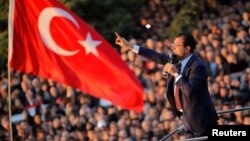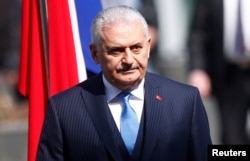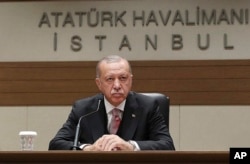After 17 days of recounts and controversies, Turkey's opposition Republican People's Party (CHP) was confirmed the official winner Wednesday in the Istanbul mayoral election.
President Recep Tayyip Erdogan is seeking to overturn the historic vote, which ends his Justice and Development Party's (AKP), and other Erdogan-affiliated parties', 25-year control of Turkey's largest city.
Ekrem Imamoglu, Istanbul's new mayor, addressed thousands of jubilant supporters outside the city's mayoral building.
"I take this victory for Turks, Kurds, Greeks and Armenians," Imamoglu said, referring to Istanbul's diverse population.
Imamoglu's victory speech included a theme of inclusivity that underpinned his winning campaign, which secured a narrow victory by 14,000 votes out of 9 million ballots cast.
Potential game changer
Victory for the CHP in Istanbul, the country's industrial, financial and cultural capital, is already touted as a potential political game changer for an opposition that has suffered nearly two decades of defeat at the hands of the AKP.
"The unquestionable significance of this election is that power can be changed through the ballot box, and that is a big change," said Soli Ozel, professor of international relations, at Istanbul's Kadir Has University. "On the other hand, it will be quite disastrous for the (AK) party — in terms of finances, power, psychology, morale— to lose Istanbul."
The AKP vigorously challenged the result, calling for numerous partial recounts of the millions of votes. In an attempt to prove fraud, interior minister Suleyman Soylu sent police to knock on the doors of Istanbul residents to confirm voter lists.
Erdogan is calling for the vote to be annulled. Tuesday, AKP officials delivered five suitcases of evidence to the Supreme Electoral Board to back calls to rescind the Istanbul election.
Analysts warn of the dangers a vote annulment holds.
"All the opponents from various parties and different ways of life are tired of this regime, and people are rejoicing now," political scientist Cengiz Aktar said. "The annulation of the vote will have a devastating effect on them. I worry about the reaction."
The High Election Board (YSK) is predominantly made up of government and presidential appointees. Opposition parties have in recent polls questioned the board's impartiality, but have raised few criticisms of its handling of the Istanbul result.
Evidence of impartiality
On election night, the YSK declared Imamoglu to be provisionally ahead, contradicting claims of victory by AKP candidate Binali Yildirim. Analysts cite the electoral board's decision to give Imamoglu the mayoral mandate, and with it further political momentum to his claim for power, as further evidence of impartiality.
"The credibility of the electoral board was on the line," Ozel said. "I think they have been compromised in other places, but at least the procedural lines were at last followed (in Istanbul).
"In that sense, it's both a political victory for Mr. Imamoglu, and at least a somewhat legal victory, too. So we are, in my judgment, on a different plateau. A threshold has been crossed," he added.
Observers suggest the AKP will be lobbying the YSK hard behind the scenes to overturn the vote, given the importance of Istanbul to the party.
"Istanbul presents so many patronage opportunities. It greases the wheels of politics for those who control it," Ozel said. "And for the AKP, in the last 25 years, they have truly mastered that, as well."
"They've generated enormous urban rents, which they used to help the dependent and poorer sections of society, but also enrich contractors, who in turn supported the party. So, that wheel of fortune will be broken," he added.
Significant risks
Any rerun of the Istanbul vote brings with it significant risks for the AKP, as well as for Erdogan. The underlining causes for the AKP's defeat — high unemployment and inflation — remain unchanged. Observers also point out that voters usually punish the party blamed for re-elections, especially any considered unjustified.
There are unconfirmed reports that the AKP has conducted private polls in Istanbul that indicate Imamoglu would win with a larger margin of victory in a revote.
Analysts also warn that Turkey's current economic woes could be further exacerbated by another Istanbul poll held in a profoundly polarized atmosphere.
Analyst Atilla Yesilada of Global Source Partners suggests while Erdogan is publicly calling for another vote, he may not be too disappointed if his calls for a new ballot are rejected.
"Erdogan's finely honed political instincts tell him repeating the elections carry several political and economic hazards, which are costlier than losing the center of cronyism," Yesilada said.













